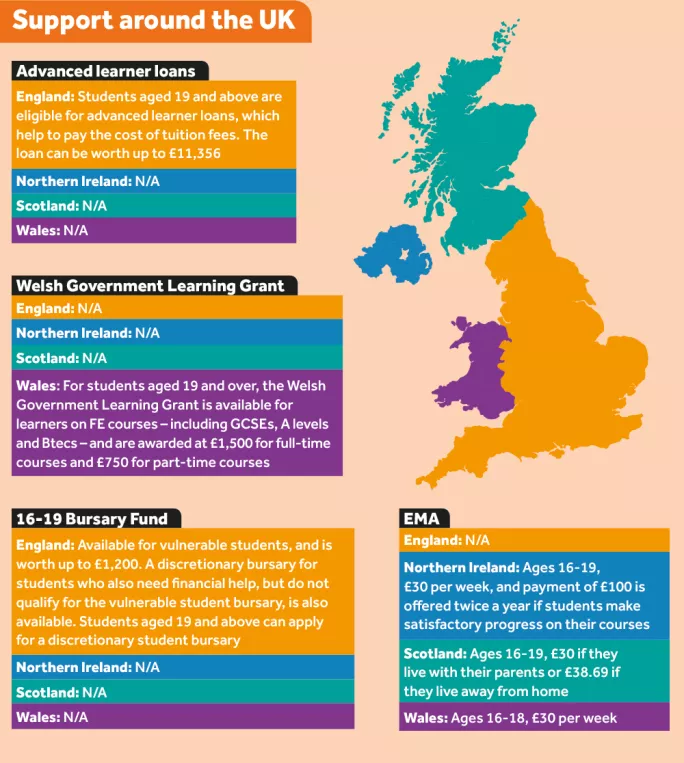
FE students’ support must be ‘fit for purpose’

Student support funding across the UK has been a serious concern to not only student representatives, but also college leaders. So when the chief executive of Virgin Money published her independent review for Scotland last week, her recommendations to put FE students on a par with their peers in higher education - while also introducing a minimum income of £8,150 and a move to write off loans for FE students if they move into HE, so they don’t get penalised - attracted much interest.
If implemented, Jayne-Anne Gadhia claimed, the total support package would be the best of any UK nation.
She said that her recommendations would “ensure that further and higher education are valued equally - with entitlement to support for students across both sectors.”
She added: “Non-repayable bursaries will continue to be focused on those from the lowest-income backgrounds. And students can, if they so wish, access high-quality student loans - on the best terms in the UK.”

So what is actually available to further education students in England, Wales, Northern Ireland and Scotland? The picture is varied, with Education Maintenance Allowance (EMA) scrapped in England but available elsewhere and bursary entitlement often left to individual colleges to decide.
In September, the NUS students’ union published evidence for a House of Lords select committee hearing into whether “post-school education funding is fit for purpose”.
The document called for, among other things, the reintroduction of EMA for students aged between 16 and 18, which used to give students a means tested allowance of up to £30 a week, but which was scrapped in 2010 by the coalition government in favour of a 16-19 bursary fund. This offers up to £1,200 - but students are not guaranteed to be offered it.
“Successive budget cuts have left many colleges in a state of financial instability,” says Emily Chapman, NUS vice president for further education. “FE delivers an education, not just a qualification. If the UK wants to keep it that way, we need a new, improved EMA introduced for learners in compulsory education to help them access their education.”
Chapman adds: “For adult learners, maintenance loans for all - not just those at Institutes of Technology and national colleges - will start to bring about the necessary change to allow everybody equal access to the support that is so vital.”
Getting an advance
Learners aged 19 and older in England can get help with the cost of their training in the form of advanced learner loans - but these must be paid back as soon as a learner finishes their course and earns over £21,000 a year.
Last year loans were offered to 19- to 23-year-olds for the first time. According to recent figures, the number of adults taking out Advanced Learner Loans has increased overall, with 93,660 students having applied for one in 2016-17. This included 21,240 learners aged between 19 and 23.
But aside from maintenance loans for students on higher level courses at a national college, learners in England get no help with their living costs after the age of 19.

In Wales, however, students aged older than 19 become eligible for the Welsh Government Learning Grant, which awards learners with up to up to £1,500 for a full-time course. Meanwhile, learners who are aged 16-18 are eligible for an EMA, which is currently set at £30 per week.
Still, student leaders feel this is not sufficient. A spokesperson for NUS Wales says: “Further education should be a transformative experience, inclusive of everyone, regardless of their background. But our research has found that 48 per cent of further education students in Wales have experienced financial difficulties that have led to them seriously considering leaving their course.”
Current proposals to reform the system, which include adopting a holistic approach to post-compulsory education, from 16 years onwards, which values and rewards “parity of esteem” between vocational and academic pathways are “excellent” says the spokesman, but “widening access must be at their heart.”
Luke Humberstone, president of NUS Scotland, says that the current support system is “broken”.
“Further education students have no guarantee that they’ll get any financial support until they start their course, and even then the amount available is a long way from reflecting the cost of living,” he explains.
‘Serious investment’
Humberstone adds the union was pleased to see the independent review into student support recommending a guaranteed, higher, level of income in further education, tied to the cost of living.
“Scotland’s poorest students - in further and higher education - need to see serious new investment in bursary support and we particularly welcome the review’s proposal to do just that.” Currently, learners are eligible for an EMA in Scotland - but colleges means test independently for any further funding, and the amount each institution receives is based on spending the previous year.
In Northern Ireland, students aged 16-18 also receive an EMA, and after the age of 18 become eligible for a “hardship fund” - which can be up to £3,500 and go towards course fees and living costs.
But Olivia Potter-Hughes, president of the NUS in Northern Ireland, says that the cost of living has increased significantly, and it is becoming more difficult for FE students “to make ends meet”.
“It is crucial that student support funding in Northern Ireland increases in line with inflation to recognise the significant increases in food, travel, accommodation, energy and other costs in recent times,” Ms Potter-Hughes says. “Many apprentices here are also struggling financially, as apprentice pay is often extremely low, and this is an issue that must be addressed immediately, too.”
And University and College Union general secretary Sally Hunt says that 16-19 students should receive more support. “We need much more support for FE students and a system that will help learners from different backgrounds succeed,” she says.
“The coalition government was wrong to remove the Education Maintenance Allowance and all politicians now need to look at how they can support people in learning and those thinking about returning. Help with travel is a good start and we back NUS’s campaign to ensure that travel costs are not be a barrier to education.”
You need a Tes subscription to read this article
Subscribe now to read this article and get other subscriber-only content:
- Unlimited access to all Tes magazine content
- Exclusive subscriber-only stories
- Award-winning email newsletters
- Unlimited access to all Tes magazine content
- Exclusive subscriber-only stories
- Award-winning email newsletters
You need a subscription to read this article
Subscribe now to read this article and get other subscriber-only content, including:
- Unlimited access to all Tes magazine content
- Exclusive subscriber-only stories
- Award-winning email newsletters
- Unlimited access to all Tes magazine content
- Exclusive subscriber-only stories
- Award-winning email newsletters